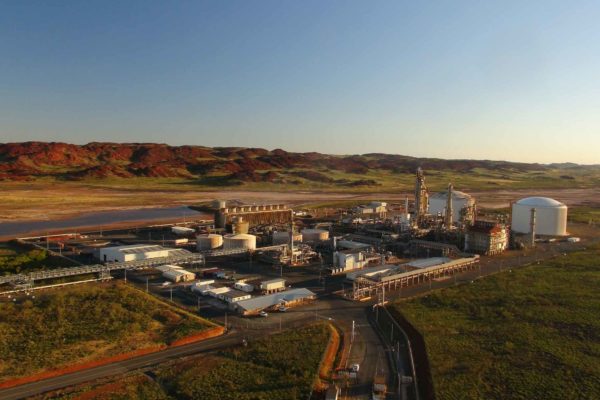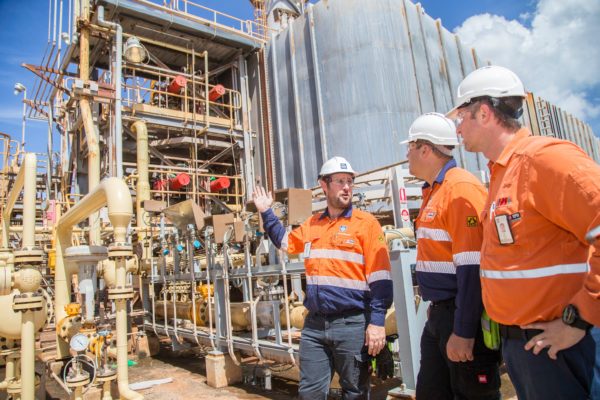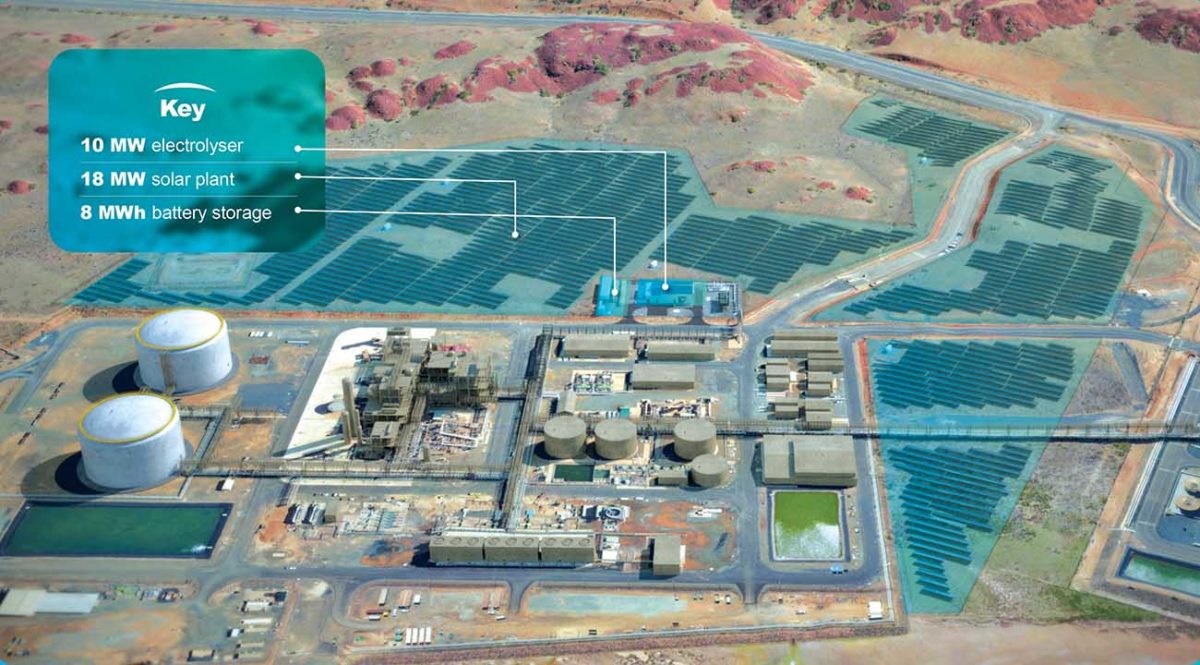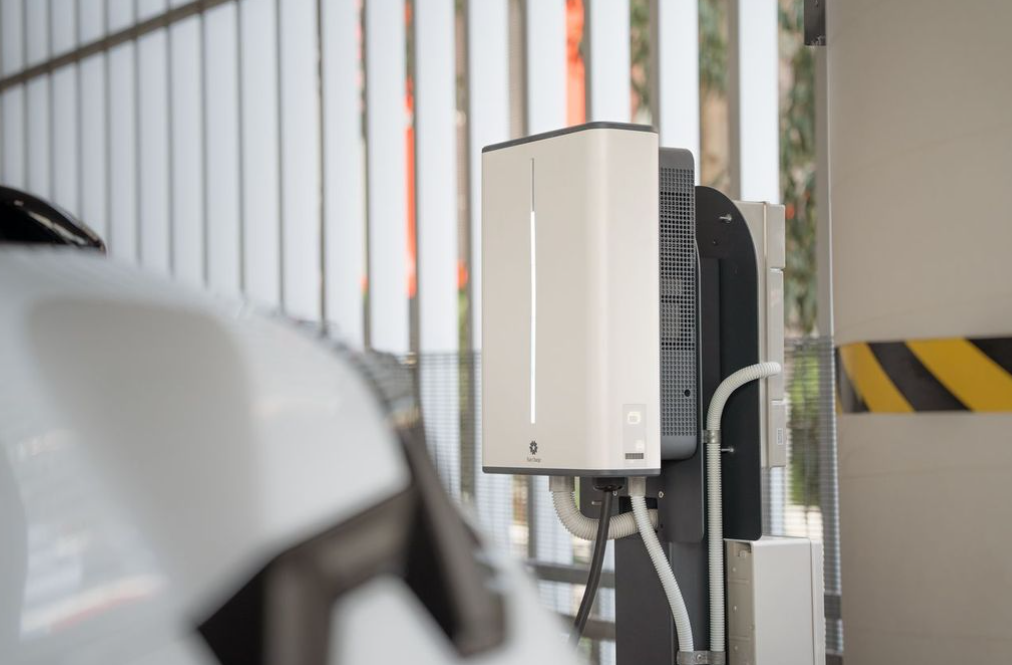Yara operates the world’s largest global ammonia network, including a world scale ammonia production facility in the Pilbara, Western Australia. In an effort to meet the growing market for green, zero carbon ammonia, Yara is collaborating with Engie to build a green ammonia plant adjacent to its existing fertiliser plant in the Pilbara.
Stage 1 of the Yuri project, as it’s named, will see a 10 MW industrial scale electrolyser installed beside an 18 MW solar plant capable of producing 600 tonnes of green ammonia each year. The biggest electrolyser currently operating in Australia is 1.25 MW at Tonsley Park in Adelaide.

Image: Yara
Hydrogen and ammonia can be made through a number of different production pathways. In addition, the supply chain from raw materials and energy all the way to end-consumer can involve many steps. The resulting carbon footprint of the hydrogen and its derivatives being consumed can therefore also vary significantly, depending not only on things like the origin of the energy and the feedstocks, but also on the methodology used for the calculation.
There is currently no detailed, widely-agreed definition of what exactly constitutes “green/blue/low-carbon/etc” hydrogen. So far, most people have been relying on different colours to differentiate between different kinds of clean hydrogen, but there are increasing calls and efforts for a more transparent and robust classification based on the specific carbon footprint of the product.
Developing such a methodology, and harmonising standards across countries and markets is critically important so that all stakeholders can make informed decisions based on facts, rather than risk falling victim to greenwashing claims.

Image: Yara
In December 2020, Hydrogen Australia (a division of the Smart Energy Council) launched its Zero Carbon Certification Scheme for renewable hydrogen, renewable ammonia and renewable metals. A world leading scheme to provide a guarantee of origin for hydrogen produced from 100% renewable energy and with zero carbon emissions.
Smart Energy Council engaged Bureau Veritas, a world leader in laboratory testing, inspection and certification services to undertake a pre-certification audit of the planned green ammonia plant.
Following a detailed engineering assessment and analysis, Bureau Veritas concluded that the ammonia plant can produce ammonia and hydrogen with carbon footprints of 0.109 kgCO2-e/kgNH3 and 0.26 kgCO2-e/kgH2, respectively. The Smart Energy Council considers this level of embedded carbon de minimis and able to be certified as Zero Carbon Renewable Ammonia. When the facility is commissioned there will be a further audit to verify that the plant has been built according to plans and specifications to achieve these standards.
“This certification will provide guarantees to Yara’s customers in Asia, Australia or Europe that the quantities supplied have been produced according to set standards and will inform the customers about key attributes such as renewable origin and greenhouse gas footprint,” Magnus Ankarstand, President of Yara Clean Ammonia, said.
The Zero Carbon Certification Scheme is backed by some of the biggest green hydrogen companies in world, the German Energy Agency, state governments of Victoria, Western Australia and Queensland, the Australian Capital Territory and the Ammonia Energy Association.
The first project certified under the scheme was the ActewAGL green hydrogen refuelling station in Fyshwick, Canberra. The German Energy Agency (DENA) and the Green Hydrogen Catapult are advisors to the scheme.
“Smart Energy Council’s scheme is important because it will enable hydrogen and related products to be certified as zero emissions. It is critical that we can track how these products are manufactured so customers can be certain that the product they select is genuinely zero emissions,” John Grimes, CEO Smart Energy Council, said.
The world is now rapidly moving to decarbonise and urgently needs zero carbon products such as renewable ammonia. Zero carbon certification is an imperative to establishing new markets with integrity and to give investors the confidence to make the leap forward.
About the authors:
Scott Hamilton is Senior Advisor at Hydrogen Australia (a division of Smart Energy Council)
Emile Herben is Product Manager, Yara Clean Ammonia.
The views and opinions expressed in this article are the author’s own, and do not necessarily reflect those held by pv magazine.
This content is protected by copyright and may not be reused. If you want to cooperate with us and would like to reuse some of our content, please contact: editors@pv-magazine.com.








May I request to clarify the mentioned numbers in the above article;
“10 MW industrial scale electrolyser installed beside an 18 MW solar plant capable of producing 600 tonnes of green ammonia each year”
Is the figure 600 Tonnes Ammonia per year correct?
best regards